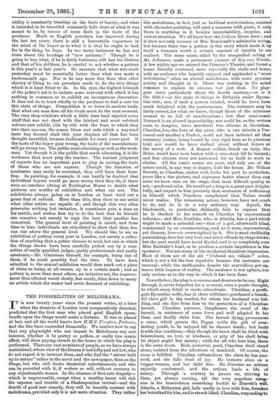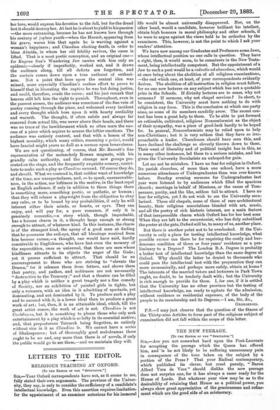lab POSSIBILITIES OF MELODRAMA.
IT is now twenty years since the present writer, at a time when the theatres of London were comparatively deserted, predicted that the first man who placed good English opera- bouffe upon the Stage would make a fortune. It was so placed at last, and all the world knows how H.M.S. Pinafore, Patience, and the like have succeeded financially. We venture now to say that any playwright who can impart to Melodrama any new interest, whether it be poetry or pathos, or really fine scenic effect, will draw paying crowds to the house in which his play is performed. There are vast numbers of people, as we have always maintained, whose view of the Drama is not lofty and not low, who do not expect it to instruct them, and who find the " mirror held np to nature" rather in the novel and the newspaper, than on the Stage, but who still desire theatrical entertainment, and who can be provided with it, if writers so will, without recourse to any objectionable means. In the absence of first-rate tragedy— which is unprocurable, except when a wealthy lessee will risk the expense and trouble of a Shakespearian revival—and the dearth of good new comedy, they will be heartily content with melodrama, provided only it is not mere situation. They rather like melodrama, in fact, just as habitual novel-readers, satiated with character-painting, will read a romance with gusto, if only there is anything in it besides improbability, surprise, and violent situation. We all know how the Colleen Baum drew ; and it drew not only because of Mrs. Boucicault's admirable acting, but because there was a pathos in the story which made it by itself a romance worth a certain amount of trouble to see realised. The same cause, aided by the unequalled acting of Mr. Jefferson, made a permanent success of Rip van Winkle. A few nights ago we entered the Princess's Theatre, and found a house literally crammed, more especially the stalls and boxes, with an audience who heartily enjoyed and applauded a "mere melodrama," often an absurd melodrama, with some genuine poetry and thought in it. There was nothing in the acted romance to explain its success, but just that. No play- goer cares particularly about the fourth century,—or is it the fifth P—or the state of things in Bithynia under Byzan- tine rule; nor, if such a person existed, would ho have been much delighted with the performance. The costumes may be fairly correct, for what we know, though those of the actresses seemed to us full of anachronisms ; but that semi-comic Tetrarch is an absurd impossibility, nor could he, as the writers seem to imagine, have murdered free citizens at discretion. Claudian, too, the hero of the piece, who is one minute a Pro- consul and another a Prefect, could not have inflicted all that summary justice, being bound by very rigid laws as to previous trial, nor would he have stalked about without lictors at the mercy of a mob. A Roman soldier, drunk on duty, like Belus, would have been beaten with a vine-stock till he fainted; and free citizens were not sentenced for no fault to work in chains. All the comic scenes are poor, and only one of the actors could, in any way or degree, hold the house. Mr. Wilson Barrett, as Claudian, recites well, looks his part to perfection, poses like a fine picture, and expresses better almost than any actor we have seen on the stage, that most difficult quality to act,—profound calm. He would act a king in a great part delight- fully, and impart to him precisely that sentiment of sufficiency in himself which Napoleon complained that Talma would never realise. The remaining actors, however, have not much to do, and do it in a very ordinary way. Agazil, the blacksmith, in particular, distinctly fails to express that he is checked in his assault on Claudian by supernatural influence ; and Miss Eastlake, who, in Almida, has a part which might be made a splendid one—that of a girl, afterwards blind, constrained by an overmastering, and, as it were, supernatural, yet illusory, love—is overweighted by it. She is moat creditably painstaking, does her very best, and never offends by stage tricks; but the part would have taxed Rachel, and is so completely over Miss Eastlake's head, as to produce a certain impatience in the spectator. Nor are many of the incidental situations impressive. Most of them are of the old " Unhand me, villain '" order, which is not a bit the less repulsive because the costumes are unusual; while the earthquake, despite the marvellous get-up, leaves little impress of reality. The audience is not aghast, but only curious as to the way in which it has been done.
Nevertheless, the play is a success, and deserves to be one. Right through it, never forgotten for a moment, runs a poetic thought, to which every detail is made subordinate. Clatidian, a profli- gate Byzantine noble, has in sheer wilfulness purchased a beanti. ful slave girl in the market, for whom her husband was bid- ding, and she flies from him to the protection of a Christian hermit. Claudian pursues, blasphemes the creed of the hermit, in sentences of some force and well adapted to his time, and finally stabs him. The hermit dying, pronounces a curse, which grants the Pagan noble the gift of ever- lasting youth, to be enjoyed till he chooses death; but loads it with this condition,—that though his heart shall be filled with benevolence, no love, or kindness, or pity of his shall bring its object aught but misery; while for all who love him, there is the same doom. Rich, powerful, good, Claudian shall stand alone, isolated from the affections of mankind. Of course, the curse is fulfilled. Claudian enfranchises the slave he has pur- sued, and she falls dead of joy. He bestows alms on a beggar-woman, and her child dies. He liberates an artisan unjustly condemned, and the artisan leads a life of misery. Through a century he passes on, striving to bless, yet always cursing, till the very populace reoeg- nise in his benevolence something hostile to Heavdn's
Almida, a Bithynian girl, falls madly in love with him, forsakes her betrothed for him, and is struck blind. Claudian, responding to
her love, would express his devotion to the full, but for the dread lest it should destroy her. At last he is about to yield to his passion —the more entrancing, because he has not known love through his century of joyless youth—when the Hermit, appearing from his grave, warns him that again he is warring against a woman's happiness ; and Claudian electing death, in order to bless Almida, in whom her old fidelity revives, the curse is lifted. That is a most poetic conception, and an original one— for Eugene Sue's Wandering Jew carries with him only an epidemic—clearly if imperfectly, worked out, and it draws the audience along, till all defects are forgotten, and the curtain comes down upon a true outburst of enthusi- asm. Not a point that bore upon the central idea was missed, more especially Claudian's useless effort to prove to himself that in liberating the captive he was but doing justice, and could, therefore, evade the curse ; and his just remark that heaven still left him the right to punish. Throughout, even in the poorest scenes, the audience was conscious of the fine vein of poetry running through the piece, and welcomed every incident and every thought which bore upon it with hearty cordiality and warmth. The thought, if often subtle and always far removed from actual life, was never above their heads, and there was no trace of the bewilderment which so often mars the suc- cess of a piece which aspires to arouse the loftier emotions. The audience was entirely content, and that with a lesson of the highest morality, which many critics, reasoning a priori, would have fancied might prove as dull as a sermon upon benevolence.
We are not questioning, of course, that Mr. Barrett's fine representation of the melancholy Roman magnate, with his grandly calm authority, and the strange new groups pre- sented on the stage, and the frequently exquisite scenery, contri- bute to make such a play as Claudian succeed. Of course they do, and should. What we contend is, that neither want of knowledge of the time, nor unexpectedness, and, so to speak, unreasonable- ness, in the action, nor loftiness in the motive, in the least repel an English audience, if only in addition to these things there is something more, something poetic, or pathetic, or human ; that they will release a playwright from the obligation to obey any rules, or to be bound by any probabilities, if only he will interest either their minds, or hearts, or 'eyes. They can enjoy, and will pay for, a pure romance, if only it is genuinely romantic,—a story which, though improbable, has a human charm in it, a thought large enough or strong enough to attract, of whatever kind. In this instance, the charm is of the strangest kind, the agony of a good man at finding that he possesses the evil-eye, that all blessings received from him become curses,—a thought, one would have said, hardly conceivable to Englishmen, who have lost even the memory of the superstition, once so universal, that there are men whose kindliness attracts to its objects the anger of the Gods ; yet it proves sufficient to attract. That should be an encouragement to those who are striving to "elevate the Drama," for it releases them from fetters, and shows them that poetry, and pathos, and nobleness are not necessarily "destructive to the Treasury;" and that a theatre can be filled by a play which is neither a great tragedy nor a fine comedy of Society, nor an exhibition of painted girls in tights, but only a romance, with an idea in it admitting of spectacle, yet dominating, and not dominated by it. To produce such a play and to succeed with it, is a lower ideal than to produce a great work of art ; but, then, it is an attainable ideal, which, till the great artist comes, the work of tart is not. Claudian is not Coriolanus, but it is something to please those who only seek entertainment by a play which is so lofty in its essential motive ; and, that preposterous Tetrarch being forgotten, so entirely without vice in it as Claudian is. We cannot have a series of Shakespeares ; but of thoroughly good melodramas there ought to be no end, any more than there is of novels, if only the public would go to see them,—and we maintain they will.



































 Previous page
Previous page